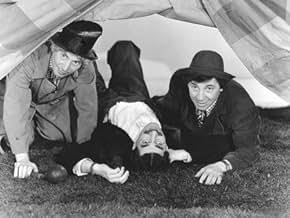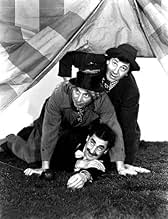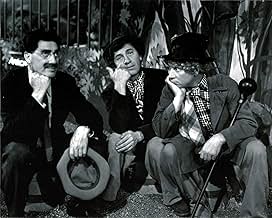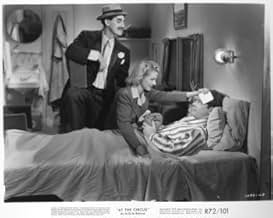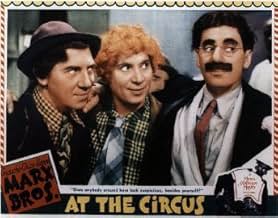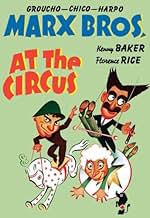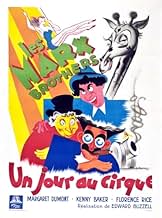NOTE IMDb
6,8/10
6,6 k
MA NOTE
Ajouter une intrigue dans votre langueThe Marx Brothers try to help the owner of a circus recover some stolen funds before he finds himself out of a job.The Marx Brothers try to help the owner of a circus recover some stolen funds before he finds himself out of a job.The Marx Brothers try to help the owner of a circus recover some stolen funds before he finds himself out of a job.
Jerry Maren
- Little Professor Atom
- (as Jerry Marenghi)
Mariska Aldrich
- Mannish Woman
- (non crédité)
Irving Bacon
- Telegraph Clerk
- (non crédité)
Willie Best
- Redcap
- (non crédité)
John Binns
- Old Man
- (non crédité)
William A. Boardway
- Party Guest
- (non crédité)
George Bookasta
- Member of Quartette
- (non crédité)
Histoire
Le saviez-vous
- AnecdotesFor Groucho Marx' performance of "'Lydia, the Tattooed Lady", additional lyrics were written by E.Y. Harburg exclusively for screenings of the film for Allied servicemen in European war zones. The special lyrics included the line "When she stands the world grows littler; When she sits, she sits on Hitler.' This version of the song was filmed, and included in prints of the film distributed in Great Britain and France, and was greeted with marked enthusiasm during screenings in those countries.
- GaffesDuring the "Swingali" number, three boys playing saxophones stand up and play "Auld Lang Syne," but the instruments heard on the soundtrack are clarinets.
- Citations
Peerless Pauline: I've waited so long to find someone like you.
J. Cheever Loophole: Oh, someone *like* me, I'm not good enough for you, eh?
- ConnexionsFeatured in From the Ends of the Earth (1939)
- Bandes originalesLydia, the Tattooed Lady
(1939) (uncredited)
Music by Harold Arlen
Lyrics by E.Y. Harburg
Sung by Groucho Marx and chorus, with Chico Marx at piano
Commentaire à la une
Music was an integral part of Marx Brothers movies, showcasing Chico's tickling the keys on the piano and Harpo's harp strumming among other singing acts. In the comedy team's ninth film, October 1939's "At The Circus," a number songs and dances were planned, with a heavy dose of parody lyrics embedded in their catchy tunes. Trouble was, MGM boss Louis Mayer didn't feel music should be part of their repertoire. While in the middle of composing the music for the Marx's, songwriters Harold Arlen and E. Y. Harburg were pulled by Mayer to work on 1939's "The Wizard of Oz." Film historians feel his was a good move since the composers wrote some of cinema's best music for the Judy Garland picture, including its number one hit "Somewhere Over The Rainbow."
Before leaving the "At The Circus" production, the two composed one of the Marx Brothers most famous songs, "Lydia the Tattooed Lady." Sung by Groucho, this became his signature song throughout the remainder of his entertainment life. It has also become a staple of many film and television shows, including in 1976's 'The Muppet Show' and in the ninth and tenth seasons of TV's 'The Walking Dead.' The Marx Brothers, crossing the 50-year-old age mark, were looking to retire from film before they even read the script of "At The Circus." Chico's enormous gambling debts created a financial pinch for him, prompting Harpo and Groucho to agree to bail him out as long as he put half of his salary he earned from the movie into lifetime locked-in investments.
Ironically in "At The Circus" Chico plays Tony, an employee for a financially-distress circus whose owner Jeff Wilson (Kenny Baker) is depending on his wealthy aunt, Mrs. Susanna Dukesbury (Margaret Dumont), to provide funding. Tony recommends to Jeff his lawyer friend, J. Cheever Loophole (Groucho), to investigate the disappearance of $10,000 Jeff had saved to pay off his creditor John Carter (James Burke). The shark Carter wants to foreclose on the loan and own the circus when he stumbles across Jeff's hidden savings. With the help of circus strongman Goliath (Ned Pendleton) and Peerless Pauline (Eve Arden), he's able to steal the money.
Performers from the recently-defunct Hagenbeck-Wallace Circus, the second largest circus in the country who shut its doors after 31 years, were hired as extras for "At The Circus." Buster Keaton, near-bankrupt himself, was hired as a gag consultant for the Marx's. He proposed a number of visual jokes, but the brothers nixed them, feeling they didn't fit their brand of humor. Groucho complained to Keaton one day about his type of jokes. The former silent movie comedian confessed, "I'm only doing what Mr. Mayer asked me to do. You guys don't need help."
This was the first movie the Marx Brothers didn't try out their routines in front of live audiences before filming. One particular scene stands out, showing Eve Arden tucking the pouch of stolen money in her bra as Groucho catches what she's doing in the corner of his eye. He talks to the 'fourth-wall,' exclaiming, "There must be some way of getting that money without getting in trouble with the Hays office," meaning the movie censors. He has her perform her circus act by walking upside down on the ceiling, with hilarious results. "The film is definitely one of their finest comedies in terms of set pieces and gags as well as the willingness to bring in some anarchy into any kind of situation," praised Steven Flores, one of the film reviewers who loved the movie.
Groucho was beginning to lose his hair at this stage of his life, and is seen throughout "At The Circus" with an exaggerated toupee. He recalled years later how a stuntman, sweating profusely in a gorilla suit, cut holes in the rented outfit to make it cooler. Its owner was so upset he took back the suit, causing the prop department to scramble for another monkey suit, only to find just a smaller orangutan outfit. Groucho claims it's easy to tell the difference between the two suits.
"At The Circus" proved to be a mix bag for the critics, with Film Daily heralding "The mad Marxmen have never been funnier, nor have they had a better story in which to cavort," while Harrison's Reports labeled it "about the worst Marx picture seen in years. Children should enjoy it, but hardly any adults." The American Film Institute nominated the song "Lydia the Tattooed Lady" for its Top 100 Songs in Movies.
Before leaving the "At The Circus" production, the two composed one of the Marx Brothers most famous songs, "Lydia the Tattooed Lady." Sung by Groucho, this became his signature song throughout the remainder of his entertainment life. It has also become a staple of many film and television shows, including in 1976's 'The Muppet Show' and in the ninth and tenth seasons of TV's 'The Walking Dead.' The Marx Brothers, crossing the 50-year-old age mark, were looking to retire from film before they even read the script of "At The Circus." Chico's enormous gambling debts created a financial pinch for him, prompting Harpo and Groucho to agree to bail him out as long as he put half of his salary he earned from the movie into lifetime locked-in investments.
Ironically in "At The Circus" Chico plays Tony, an employee for a financially-distress circus whose owner Jeff Wilson (Kenny Baker) is depending on his wealthy aunt, Mrs. Susanna Dukesbury (Margaret Dumont), to provide funding. Tony recommends to Jeff his lawyer friend, J. Cheever Loophole (Groucho), to investigate the disappearance of $10,000 Jeff had saved to pay off his creditor John Carter (James Burke). The shark Carter wants to foreclose on the loan and own the circus when he stumbles across Jeff's hidden savings. With the help of circus strongman Goliath (Ned Pendleton) and Peerless Pauline (Eve Arden), he's able to steal the money.
Performers from the recently-defunct Hagenbeck-Wallace Circus, the second largest circus in the country who shut its doors after 31 years, were hired as extras for "At The Circus." Buster Keaton, near-bankrupt himself, was hired as a gag consultant for the Marx's. He proposed a number of visual jokes, but the brothers nixed them, feeling they didn't fit their brand of humor. Groucho complained to Keaton one day about his type of jokes. The former silent movie comedian confessed, "I'm only doing what Mr. Mayer asked me to do. You guys don't need help."
This was the first movie the Marx Brothers didn't try out their routines in front of live audiences before filming. One particular scene stands out, showing Eve Arden tucking the pouch of stolen money in her bra as Groucho catches what she's doing in the corner of his eye. He talks to the 'fourth-wall,' exclaiming, "There must be some way of getting that money without getting in trouble with the Hays office," meaning the movie censors. He has her perform her circus act by walking upside down on the ceiling, with hilarious results. "The film is definitely one of their finest comedies in terms of set pieces and gags as well as the willingness to bring in some anarchy into any kind of situation," praised Steven Flores, one of the film reviewers who loved the movie.
Groucho was beginning to lose his hair at this stage of his life, and is seen throughout "At The Circus" with an exaggerated toupee. He recalled years later how a stuntman, sweating profusely in a gorilla suit, cut holes in the rented outfit to make it cooler. Its owner was so upset he took back the suit, causing the prop department to scramble for another monkey suit, only to find just a smaller orangutan outfit. Groucho claims it's easy to tell the difference between the two suits.
"At The Circus" proved to be a mix bag for the critics, with Film Daily heralding "The mad Marxmen have never been funnier, nor have they had a better story in which to cavort," while Harrison's Reports labeled it "about the worst Marx picture seen in years. Children should enjoy it, but hardly any adults." The American Film Institute nominated the song "Lydia the Tattooed Lady" for its Top 100 Songs in Movies.
- springfieldrental
- 23 mars 2024
- Permalien
Meilleurs choix
Connectez-vous pour évaluer et suivre la liste de favoris afin de recevoir des recommandations personnalisées
- How long is At the Circus?Alimenté par Alexa
Détails
- Durée1 heure 27 minutes
- Couleur
- Rapport de forme
- 1.37 : 1
Contribuer à cette page
Suggérer une modification ou ajouter du contenu manquant

Lacune principale
By what name was Un jour au cirque (1939) officially released in India in English?
Répondre

